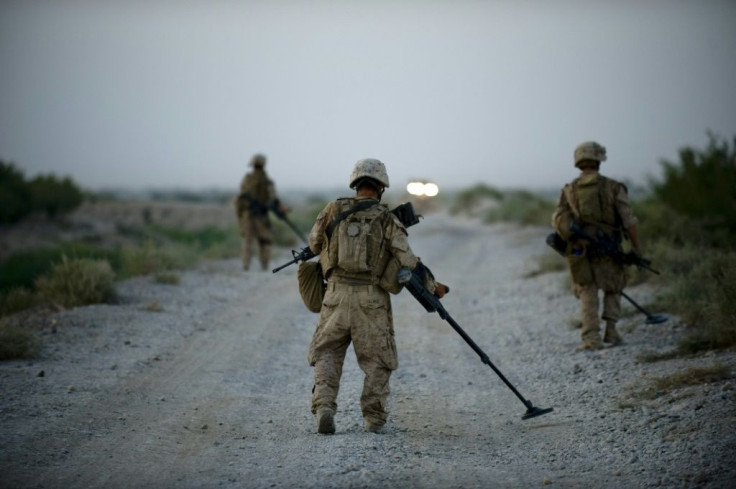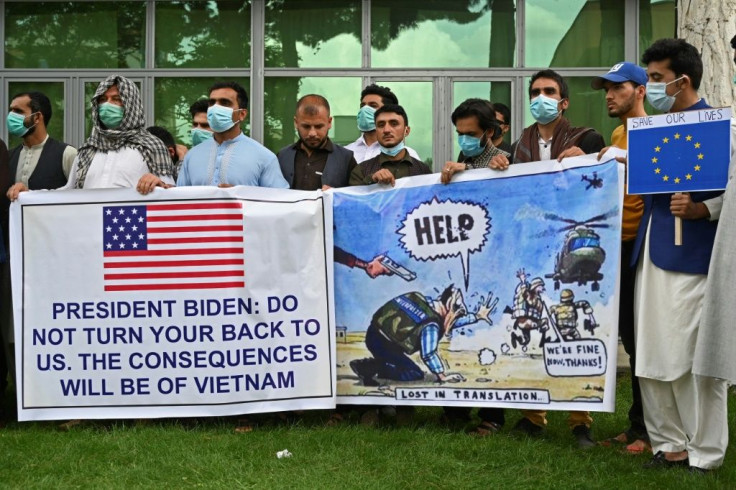First Flight Of Afghan Interpreters Fleeing Taliban Arrives In US
More than 200 Afghan interpreters who helped US troops and diplomats arrived in the United States Friday, the government said, the first of tens of thousands expected to immigrate to flee the threat of Taliban retaliation.
President Joe Biden announced the arrival of the first of several such flights expected through August, as the US withdraws its last troops and rushes to move to safety those Afghans who provided crucial help during the two decades of war.
"Today is an important milestone as we continue to fulfill our promise to the thousands of Afghan nationals who served shoulder-to-shoulder with American troops and diplomats over the last 20 years in Afghanistan," Biden said in a statement.
"I want to thank these brave Afghans for standing with the United States, and today, I am proud to say to them: 'Welcome home,'" he added.
An estimated 20,000 Afghans worked for the United States following the 2001 invasion of Afghanistan in the wake of the 9/11 attacks, and are seeking evacuation under the State Department's Special Immigrant Visa (SIV) program.
That includes not just interpreters but those providing intelligence support and other sensitive jobs to US and allied forces.

Including their families, the number that could be ferried to new homes in the United States under what has been dubbed "Operation Allies Refuge" could reach as much as 100,000, by some estimates.
Many fear retaliation from the Taliban, which has secured a vast swath of the country since foreign troops began the last stage of a withdrawal due to be complete by late August.
Pressure is building to evacuate them amid fears that Afghan forces could be overwhelmed by the Taliban in the absence of US troop support over the coming months.
On Thursday Congress passed extra funding of $1.1 billion to support the resettlement of Afghans.
The first arrivals under the SIV program had already completed extensive background checks and security screenings. They have been taken to the US Army's Fort Lee near Petersburg, Virginia where they will undergo medical checks, receive Covid vaccines if they haven't already and undergo other processing.
Then, with the help of the UN International Organization for Migration, they will be sent to new homes -- either with relatives already in the United States, or arranged by the IOM and State Department.

According to Russ Travers, an official on the White House National Security Council, the first flight is part of a broader group of about 2,500, including families, who are furthest along in the screening process and will arrive over the next few weeks.
Secretary of State Antony Blinken said they join over 70,000 Afghans who have received SIVs and moved to the United States since 2008.
"America has a longstanding tradition of opening our arms to immigrants, refugees, and others, and this flight stands as the latest example," Blinken said in a statement.
But thousands more are in the pipeline awaiting security checks and clearance to leave Afghanistan.
Some have held protests in Kabul in recent weeks to highlight their plight, amid reports that several Afghans who worked for US forces have been tracked down and killed by the Taliban.
Hampered by a smaller US diplomatic and military footprint in Kabul, and Covid pandemic restrictions, the backlog is substantial, US officials admit.
"We absolutely intend to continue this program after the pullout of troops" on August 31, said Tracey Jacobson, the State Department's Afghanistan Task Force director.
"We're going to be moving folks as fast as we logistically can," she added.
For those who qualify but have not been thoroughly vetted, the US is expected to move them to third countries to await final approval to immigrate.
Senator Tim Kaine said Friday that Kuwait and Qatar "are sites that will be used," and that US officials are discussing using Kosovo and Kazakhstan, which borders Afghanistan.
Jacobson said Washington is weighing how to help Afghans who do not qualify for the program but also face particular threats -- such as women leaders, human rights activists and journalists.
"The administration is considering a variety of different options," she said.
© Copyright AFP {{Year}}. All rights reserved.




















